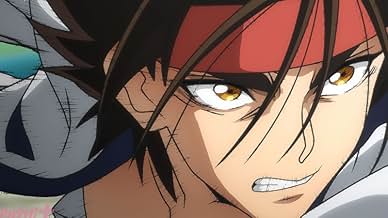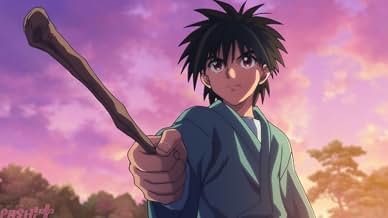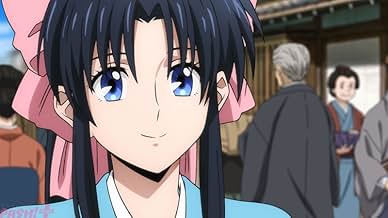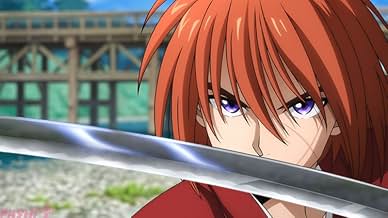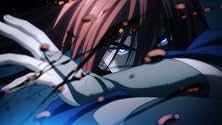Ajouter une intrigue dans votre langueIn the era known as Bakumatsu, there was an ishin assassin known as Hitokiri Battousai; eleven years later he returned as a wandering swordsman, Himura Kenshin.In the era known as Bakumatsu, there was an ishin assassin known as Hitokiri Battousai; eleven years later he returned as a wandering swordsman, Himura Kenshin.In the era known as Bakumatsu, there was an ishin assassin known as Hitokiri Battousai; eleven years later he returned as a wandering swordsman, Himura Kenshin.
Parcourir les épisodes
Crunchyroll's Fall 2024 Anime Lineup
Crunchyroll's Fall 2024 Anime Lineup
Get details on all the amazing series (subbed and dubbed!) streaming on Crunchyroll this fall.
Histoire
Le saviez-vous
- AnecdotesSuzume & Ayame, Dr. Gensai's nieces were not included in this series. like they were in Rurôni Kenshin - Meiji kenkaku romantan (1996).
- ConnexionsRemake of Rurôni Kenshin - Meiji kenkaku romantan (1996)
Commentaire en vedette
Rurouni Kenshin is about an ex-assassin who vows never to kill again. Throughout the story, he is haunted by his past as he tries to uphold his vow and still be able to save the people around him.
This series, while still remaining shonen (for teenage boys) with majority of its tropes, can actually be pretty deep at times, and it is very poetic in how it tells its story. Everything has layers of meaning. Characters' names, appearances, and events that take place often have symbolic properties down to the trees in the background.
The most obvious example is how everyone around Kenshin either stands for his redemption or they are foils to him, particularly the villains; this is a lot more apparent in the second arc.
Another thing I really like about this show (and manga) is its depiction of history. It's not rosy-lensed about the new or old ages. It takes place in the 1870's right when Japan was beginning to modernize after the Imperialists defeated the Shogunate. It's basically the same time as "The Last Samurai", dealing with similar things, except it doesn't romanticize one side over another. It shows the good and the bad that the modernization led to. It also shows the reasons it happened in the first place. In short, it shows that corruption led to the civil war, and now the new government is just as corrupt. The ones constantly caught in the middle of it all are the common people, who suffer just the same under the new government. It can be surprisingly smart at times given how "cool", action-oriented, and comedic it is.
Comparison to the old series:
The action animation is much more fluid as should be expected. The colors are more vibrant. And the natural scenery is beautifully animated with digital effects only a modern anime can offer.
I think the music is pretty good. There are no themes I really object to. The old series will always have an iconic score, however. Personally, a lot of the music in the old show felt dated (90's) and out of place in an historical setting. The new show does not make the music sound any more authentic, but it distracted me less. With that said, the old show still had some really good music, which I admit was more memorable, but that should not discount the new score.
The style of the new show is certainly more mainstream. The directors did not choose to make the show feel radically different from everything else, which I do not mind at all. Whatever one can say about the old show, it had a very unique style. The choice of tilted angles, random color changes,bright flashes and their abilities being displayed in writing when the characters are in combat was both unique and fun to watch. Certain choices, however, I found to be odd and distracting, such as x-ray colors. So, with that said, I do not mind the more generic mainstream feel, but I do wish they were a little more creative, and they are difinitely getting there. The Kyoto arc so far has had some really cool creative visual choices.
The new show follows the source material much closer, which is almost always a possitive. There is no filler and the scenes take direct panels and put them to screen. Because the manga was not always that detailed and tended to make every conversation a simple back-and-forth of faces, though, the new show suffers a little bit from lack of unique angles; many shots are basic, but I do not think it is bad. That said, I like how the new show does not add filler and tries to be more faithful; we just have a less creative, less ambitious retelling of the original manga, and that is fine with me. It is better to be faithful and do a great job than to be less faithful and hope it works. For me, the old show felt like half the time the creative choices did not work at all, while the other half went above and beyond anything I could have hoped for.
The biggest advantage the new show has over the old one, which strongly justifies its production, is that the studio plans to adapt the ENTIRE story, not just the first two arcs. Yes, yes, the manga was not complete when the old show was airing, but still, even after the last arcs were written, I wonder why they didn't try to adapt them. There were several OVA's that adapted parts like Trust and Betrayal and Reflection, but they weren't continuations.
In conclusion, this new adaptation of the beloved manga faithfully honors the source material and even if you were not a fan of the original show, you would still probably really enjoy this show. I personally think it's better than the original in most ways (e.g. Lack of filler) and it's not hard at all to keep up with. I am not in any way downplaying the significance or greatness of the old show. I think it's really good, but it has its flaws as does this new one. If you were a fan of the old show, I still highly recommend this one because it still tells the story we all love; moreover, it will tell the WHOLE story.
This series, while still remaining shonen (for teenage boys) with majority of its tropes, can actually be pretty deep at times, and it is very poetic in how it tells its story. Everything has layers of meaning. Characters' names, appearances, and events that take place often have symbolic properties down to the trees in the background.
The most obvious example is how everyone around Kenshin either stands for his redemption or they are foils to him, particularly the villains; this is a lot more apparent in the second arc.
Another thing I really like about this show (and manga) is its depiction of history. It's not rosy-lensed about the new or old ages. It takes place in the 1870's right when Japan was beginning to modernize after the Imperialists defeated the Shogunate. It's basically the same time as "The Last Samurai", dealing with similar things, except it doesn't romanticize one side over another. It shows the good and the bad that the modernization led to. It also shows the reasons it happened in the first place. In short, it shows that corruption led to the civil war, and now the new government is just as corrupt. The ones constantly caught in the middle of it all are the common people, who suffer just the same under the new government. It can be surprisingly smart at times given how "cool", action-oriented, and comedic it is.
Comparison to the old series:
The action animation is much more fluid as should be expected. The colors are more vibrant. And the natural scenery is beautifully animated with digital effects only a modern anime can offer.
I think the music is pretty good. There are no themes I really object to. The old series will always have an iconic score, however. Personally, a lot of the music in the old show felt dated (90's) and out of place in an historical setting. The new show does not make the music sound any more authentic, but it distracted me less. With that said, the old show still had some really good music, which I admit was more memorable, but that should not discount the new score.
The style of the new show is certainly more mainstream. The directors did not choose to make the show feel radically different from everything else, which I do not mind at all. Whatever one can say about the old show, it had a very unique style. The choice of tilted angles, random color changes,bright flashes and their abilities being displayed in writing when the characters are in combat was both unique and fun to watch. Certain choices, however, I found to be odd and distracting, such as x-ray colors. So, with that said, I do not mind the more generic mainstream feel, but I do wish they were a little more creative, and they are difinitely getting there. The Kyoto arc so far has had some really cool creative visual choices.
The new show follows the source material much closer, which is almost always a possitive. There is no filler and the scenes take direct panels and put them to screen. Because the manga was not always that detailed and tended to make every conversation a simple back-and-forth of faces, though, the new show suffers a little bit from lack of unique angles; many shots are basic, but I do not think it is bad. That said, I like how the new show does not add filler and tries to be more faithful; we just have a less creative, less ambitious retelling of the original manga, and that is fine with me. It is better to be faithful and do a great job than to be less faithful and hope it works. For me, the old show felt like half the time the creative choices did not work at all, while the other half went above and beyond anything I could have hoped for.
The biggest advantage the new show has over the old one, which strongly justifies its production, is that the studio plans to adapt the ENTIRE story, not just the first two arcs. Yes, yes, the manga was not complete when the old show was airing, but still, even after the last arcs were written, I wonder why they didn't try to adapt them. There were several OVA's that adapted parts like Trust and Betrayal and Reflection, but they weren't continuations.
In conclusion, this new adaptation of the beloved manga faithfully honors the source material and even if you were not a fan of the original show, you would still probably really enjoy this show. I personally think it's better than the original in most ways (e.g. Lack of filler) and it's not hard at all to keep up with. I am not in any way downplaying the significance or greatness of the old show. I think it's really good, but it has its flaws as does this new one. If you were a fan of the old show, I still highly recommend this one because it still tells the story we all love; moreover, it will tell the WHOLE story.
- Thorfinn_Karlsefni
- 13 nov. 2024
- Lien permanent
Meilleurs choix
Connectez-vous pour évaluer et surveiller les recommandations personnalisées
- How many seasons does Rurouni Kenshin have?Propulsé par Alexa
Détails
- Durée24 minutes
- Couleur
- Mixage
Contribuer à cette page
Suggérer une modification ou ajouter du contenu manquant

Lacune principale
What is the Canadian French language plot outline for Rurôni Kenshin: Meiji kenkaku romantan (2023)?
Répondre

